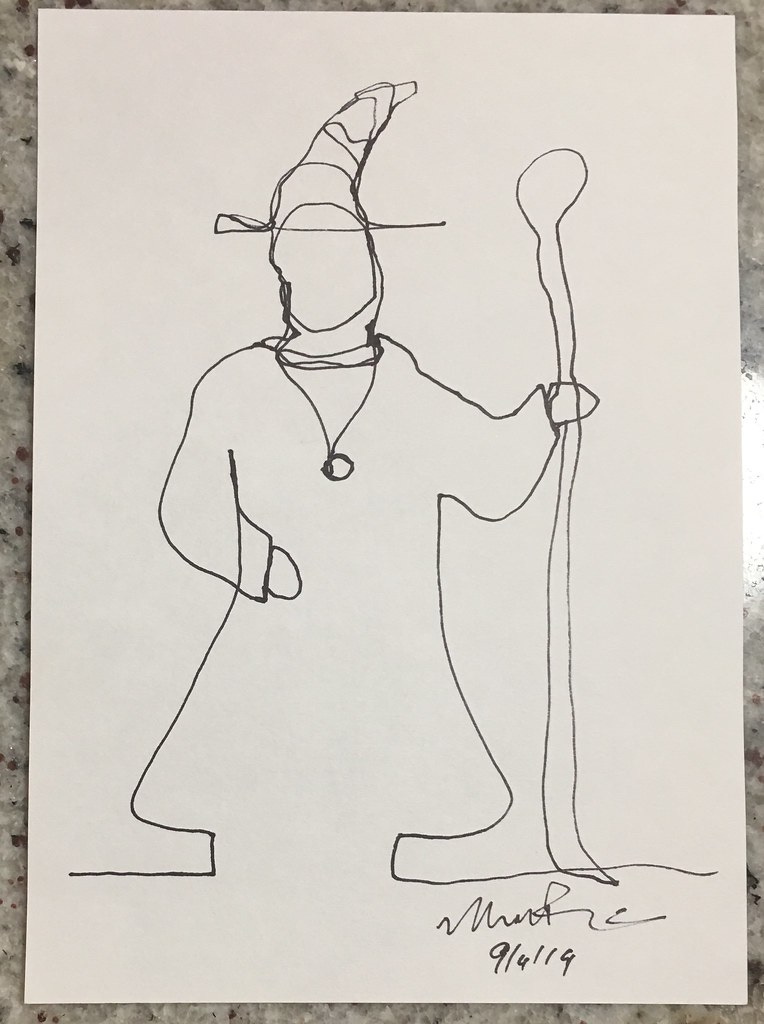RWL Newsletter #139 - home health, babies, & getting social

Greetings from the University of New Hampshire! Week 2 of the semester is done. For those of you out there who are teachers, you know we’re still in the getting-to-know-you phase. Students are still figuring out the rhythm of the semester, and frankly so am I. I completely revamped my management class this semester, with more presentations and more group discussions in the learning management system (online, outside of class). It’s a lot of work for me, but I’m hoping it will be a good experience for my students. I have the biggest class I’ve ever tried to teach management to - 55 students - so it’s really hard to generate and manage in-class participation which I think is the best way to teach management.
Picture above is part of my #100gifts project. I gave a picture of a dragon to the son of one of my high school friends because he (the son) is into the Dungeons and Dragons game (when I was a kid, my friend and I used to play all the time - we were totally the nerdy kids in Stranger Things). The son sent me a nice thank you note back with his own picture of a dragon and asked for advice about drawing. So I sent him this line drawing of a wizard and told him what I think are two important pieces of advice if you want to build a skill: 1) do a little bit every day, and 2) accept that most days, what you do is going to suck, but if you keep at it, every day, eventually the average product will improve. Now I didn’t use those words for a 10 year old - but I am using them for us. Setting a personal goal of making art every day has been a great way of reminding myself of the value of disciplined practice for anything. (The challenge of a line drawing is it has to be one continuous line - once you start, you can't pick the pen up.)
Now, on to the links!
Read
What: NYT, On the Job, 24 Hours a Day, 27 Days a Month
https://www.nytimes.com/2019/09/02/nyregion/home-health-aide.html?smid=nytcore-ios-share
Why: This is a very well written profile of a live-in home health aide. As our population ages, we will need more people to do these kinds of jobs, especially as people try to avoid being committed to a facility and try instead to age at home. The pay is low and the work is trying. Marjorie, the aide profiled, strikes me as something of a saint. My favorite line in the article is a quote from Marjorie, “If I take a client and I have the respect,” she said, “I will stay through to the end.”
For those of you interested in long term care (should be all of us because if we’re lucky, we’re going to need it), or teaching the topic, this is a great article.
Thanks to Jon M. for the pointer.
Watch
What: Hans Rosling, Religions and Babies
Why: I gave an introductory lecture this week on the healthcare policy environment for my “Management of a Healthcare Organziation” class. As part of the lecture, I showed one of my favorite Hans Rosling videos, “200 Countries, 200 Years” to make the point that there is a link between health and wealth. Since I’m pretty sure I shared that video once upon a time previously on RWL, and I try not to repeat myself, I went poking around the Rosling archives for a video I hadn’t seen before. I came across this one - Religion and Babies. Based on the first video I mentioned, I expected a similar outcome. The actual outcome is a bit different. The message is good, too. (I’m not going to give away the punchline - you’ll have to watch.) If you don’t know who Rosling is, watch the 200 Countries video first. Then watch his video, The Magic Washing Machine, then watch this one. He was really great.
Listen
What: JAMA, Getting Social: Physicians Can Counteract Misinformation With an Online Presence
https://jamanetwork.com/journals/jama/article-abstract/2747393
Why: Dr. Chiang makes an argument that most physicians should have an online presence. The argument is essentially if physicians aren’t online sharing their knowledge, then charlatans will. I think some physicians should be online sharing their knowledge for a variety of reasons - because ostensibly they hold high rank in society because they care about the public well being, and by sharing their knowledge they could improve public well being, and from a marketing perspective, they should have a public presence. I think there are some arguments against as well - maintaining an online presence is time consuming and not every physician communicates well in writing, and giving out medical advice and opinions comes with big risks in a litigious society like the US. It’s an interesting interview nonetheless.
Thanks for reading and see you next week! If you come across any interesting stories, won't you send them my way? I'd love to hear what you think of these suggestions, and I'd love to get suggestions from you. Feel free to drop me a line at mark.bonica@unh.edu , or you can tweet to me at @mbonica .
Also, if you find these links interesting, won’t you tell a friend? They can subscribe here: https://tinyletter.com/markbonica
Have a great weekend and do amazing things!
Mark
Mark J. Bonica, Ph.D., MBA, MS
Assistant Professor
Department of Health Management and Policy
University of New Hampshire
(603) 862-0598
mark.bonica@unh.edu
Health Leader Forge Podcast: http://healthleaderforge.org
"I know of no more encouraging fact than the unquestionable ability of man to elevate his life by a conscious endeavor." - Henry David Thoreau



